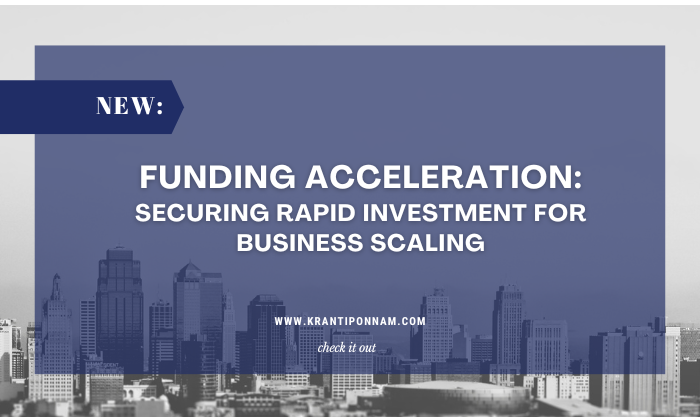One of the biggest challenges that entrepreneurs face is securing enough funding to scale their businesses. Scaling is the process of growing a business by increasing its customer base, revenue, market share, and impact. Scaling requires not only a viable product or service, but also a solid strategy, a strong team, and sufficient resources.
However, scaling also involves a lot of risks, uncertainties, and expenses. Many startups struggle to raise enough capital to support their growth plans, especially in the early stages of their ventures. According to a report by Startup Genome, 29% of startups fail because they run out of cash.
So how can entrepreneurs overcome this challenge and secure rapid investment for business scaling? In this blog, we will explore some of the most effective funding options, strategies, and tips for entrepreneurs who want to accelerate their growth and reach their full potential.
There are many sources of funding available for entrepreneurs who want to scale their businesses, each with its own advantages and disadvantages. Some of the most common ones are:
## Funding Options for Business Scaling
– **Venture capital (VC)**: Venture capital is a form of equity financing, where investors provide funds to startups in exchange for a share of ownership and control. VC investors typically look for high-growth, high-potential, and innovative businesses that can generate large returns in the long term. VC funding can provide a lot of capital, expertise, network, and credibility to entrepreneurs, but it also comes with high expectations, dilution, and loss of autonomy.
– **Angel investors**: Angel investors are wealthy individuals who invest their own money in startups, usually at the seed or early stages. Angel investors are often former entrepreneurs, executives, or industry experts who can offer valuable advice, mentorship, and connections to entrepreneurs. Angel investors tend to be more flexible, supportive, and patient than VC investors, but they also have limited funds, availability, and influence.
– **Seed funding**: Seed funding is a type of early-stage financing, where investors provide small amounts of capital to help startups validate their ideas, develop their products, and test their markets. Seed funding can come from various sources, such as angel investors, VC funds, crowdfunding platforms, incubators, accelerators, or grants. Seed funding can help entrepreneurs launch their businesses, gain traction, and prepare for larger rounds of funding, but it can also be difficult to obtain, competitive, and time-consuming.
– **Accelerator programs**: Accelerator programs are intensive, short-term programs that provide startups with mentorship, training, resources, and access to investors. Accelerator programs usually last for a few weeks or months, and culminate in a demo day, where startups pitch their businesses to potential investors. Accelerator programs can help entrepreneurs accelerate their learning, growth, and fundraising, but they can also be selective, demanding, and costly.
– **Growth capital**: Growth capital is a type of later-stage financing, where investors provide funds to established, profitable, and scalable businesses that need capital to expand their operations, enter new markets, or acquire other businesses. Growth capital can come from various sources, such as VC funds, private equity firms, banks, or corporate investors. Growth capital can help entrepreneurs scale their businesses, increase their valuation, and achieve market leadership, but it can also be challenging to secure, expensive, and restrictive.
## Funding Strategies for Business Scaling
Choosing the right funding option for business scaling depends on several factors, such as the stage, size, industry, and goals of the business, as well as the availability, preferences, and expectations of the investors. However, there are some general strategies that entrepreneurs can follow to increase their chances of securing rapid investment for business scaling, such as:
– **Build a scalable business model**: A scalable business model is one that can generate consistent, predictable, and profitable revenue, while minimizing the costs, risks, and dependencies of the business. A scalable business model is attractive to investors, as it demonstrates the potential and viability of the business, as well as the ability and vision of the entrepreneur. To build a scalable business model, entrepreneurs should focus on creating value for their customers, solving real problems, delivering unique solutions, and achieving product-market fit.
– **Develop a compelling pitch deck**: A pitch deck is a presentation that summarizes the key aspects of the business, such as the problem, solution, market, traction, team, and financials. A pitch deck is essential for communicating the value proposition, vision, and goals of the business to investors, as well as for capturing their attention, interest, and trust. To develop a compelling pitch deck, entrepreneurs should follow a clear, concise, and convincing structure, use data and evidence to support their claims, and highlight their competitive advantages and opportunities.
– **Network and research potential investors**: Networking and researching potential investors is crucial for finding the right fit, timing, and terms for funding. Networking can help entrepreneurs build relationships, reputation, and referrals with investors, as well as gain insights, feedback, and advice from them. Researching can help entrepreneurs identify and target the most relevant, interested, and compatible investors, as well as understand their criteria, preferences, and expectations. To network and research potential investors, entrepreneurs should leverage their existing contacts, attend events, use online platforms, and conduct due diligence.
– **Prepare and practice for the pitch**: Preparing and practicing for the pitch is important for delivering a confident, professional, and persuasive presentation to investors, as well as for handling questions, objections, and negotiations. Preparing can help entrepreneurs refine their message, strategy, and materials, as well as anticipate and address potential issues and challenges. Practicing can help entrepreneurs improve their skills, performance, and comfort, as well as receive and incorporate feedback and suggestions. To prepare and practice for the pitch, entrepreneurs should review their pitch deck, rehearse their speech, and seek input and support from others.
## Funding Tips for Business Scaling
In addition to the strategies mentioned above, there are some tips that entrepreneurs can follow to secure rapid investment for business scaling, such as:
– **Start fundraising early**: Starting fundraising early can help entrepreneurs avoid running out of cash, missing out on opportunities, or compromising on their vision. Fundraising can take longer than expected, as it involves multiple steps, stages, and stakeholders. Therefore, entrepreneurs should start fundraising at least 6 to 12 months before they need the funds, and plan ahead for their runway, milestones, and contingencies.
– **Be realistic and flexible**: Being realistic and flexible can help entrepreneurs adapt to the changing market conditions, investor demands, and business needs. Fundraising can be unpredictable, uncertain, and competitive, as it depends on various factors, such as the economy, industry, trends, and competition. Therefore, entrepreneurs should be realistic about their valuation, goals, and expectations, and flexible about their options, terms, and outcomes.
– **Show traction and growth**: Showing traction and growth can help entrepreneurs prove their worth, potential, and credibility to investors, as well as increase their valuation, leverage, and bargaining power. Traction and growth can be measured by various metrics, such as revenue, customers, users, retention, engagement, and referrals. Therefore, entrepreneurs should focus on achieving and demonstrating tangible, consistent, and impressive results, and highlight their impact, progress, and achievements.
– **Seek quality over quantity**: Seeking quality over quantity can help entrepreneurs optimize their time, energy, and resources, as well as maximize their chances of success, satisfaction, and alignment. Fundraising can be overwhelming, exhausting, and distracting, as it involves a lot of research, outreach, meetings, and follow-ups. Therefore, entrepreneurs should prioritize quality over quantity, and focus on finding and engaging with the best-fit, value-adding, and long-term investors, rather than chasing and wasting time on the wrong, uninterested, or short-term ones.
## Conclusion
Funding acceleration is the process of securing rapid investment for business scaling. Funding acceleration can help entrepreneurs overcome one of the biggest challenges they face, and enable them to grow their businesses, reach their goals, and make a difference. However, funding acceleration also requires a lot of preparation, strategy, and skill, as well as a lot of options, opportunities, and decisions.
In this blog, we have discussed some of the most effective funding options, strategies, and tips for entrepreneurs who want to secure rapid investment for business scaling. We hope that this blog has provided you with some useful information, insights, and guidance, and that it has inspired you to pursue your entrepreneurial dreams and aspirations.
If you have any questions, comments, or feedback, please feel free to share them with us. We would love to hear from you and learn from your experiences. Thank you for reading and happy scaling!




